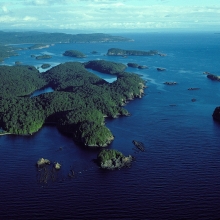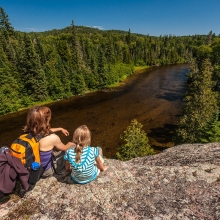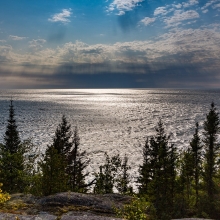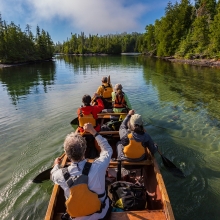Gargantua Islands Preserve
Cape Gargantua – with its imposing cliffs, ancient cedars, and screen of volcanic rock islands – is one of the most special and significant places on the entire Lake Superior coast. In 2011, Lake Superior Park approached LSWC about acquiring the islands from the American property owners, three brothers of the Gilpin family. American Friends of Canadian Conservation (AFCC) facilitated this opportunity between LSWC and Kenneth Gilpin. AFCC’s unique conservation services benefit both the Americans who own valuable conservation property in Canada, and Canadian land trusts, like ours, that can steward the lands for perpetuity.
An archipelago of twenty islands makes up this LSWC Preserve. They range in size from half-acre rocky shoals to 50-acre islands. This Preserve includes numerous raised beaches, pock-marked basaltic rock, colourful pebble shorelines, and sculpted island silhouettes. This iconic geological wonder tells part of the Midcontinent Rift story that nearly split apart North America (Turtle Island) a billion years ago.
The Lake Superior Water Trail weaving through the Gargantua Islands Preserve is the water route that has been in use for millennia by travellers, traders and fishers. Today it is still a place of wonder for all who visit the archipelago.
To Batchewana First Nation, this is Nanabozhung: a place of great spiritual significance. Gargantua Harbour has a long history of occupation. In the process of developing Lake Superior Park, Batchewana First Nation community members were evicted from this ancestral fishing village, an all-too-common colonial practice. Reconciling the wrongs of the past requires much truth-telling. Today Batchewana First Nation is reclaiming their physical presence here to bring traditional knowledge, healing and ceremony back to Nanabozhung.








